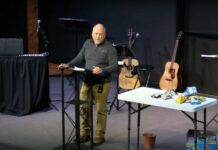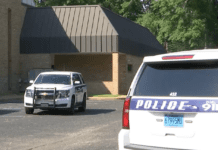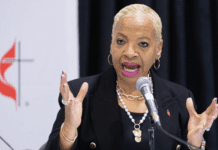What does it mean to be Southern Baptist?
Well, you’re a member of a Southern Baptist church is the lowest denominator. We’ve got 14 million of them, but that doesn’t mean the same thing to all of them.
A Southern Baptist church is a church that has agreed voluntarily to unite with other churches for common cause. Those causes for benevolence and missions, evangelistic causes. That’s spread through the years to theological education, disaster relief and social concerns.
We’re just saying, yeah, we can cooperate to get in these areas. We do that without giving up any of our autonomy or independence. I’d love to say that to my independent Baptist friends, look, Grace Baptist Church is as independent as you are. Nobody dictates to us. We just partner on mission. We’ve agreed that we think this is a good idea. We can do more together with others than we can do by ourselves. And that’s been manifested time and again. It’s an awareness of all of that and a willingness to say, “Okay, we’re going to work together with other churches that aren’t our church,” which means that they’re not going to do everything the way you would do it.
What are some of the local and state partnerships that stick out to you?
We’ve been involved in immigrant ministry here in Florida. Some of the migrant farmworkers are just abused. They’re treated miserably. We’ve been involved in trying to help immigrants. Our immigration system is broken.
The association’s done some wonderful things like that. We’ve worked with disaster relief. When you live in the wake of hurricanes, you’re looking for help. Southern Baptist disaster relief is second to none. They’re there before the Red Cross, and the Red Cross takes tips from our Southern Baptist Disaster Relief. And I’m very grateful for that.
We’ve worked in theological education. Obviously, I went to Southwestern and was able to do that far less expensively than I would have otherwise. We’ve also sent missionaries through the IMB.
What does it mean to be conservative, liberal, woke, etc.?
I mean conservative and liberal, they’re almost meaningless anymore. You know, if Fox News is conservative, then I’m Atilla the Hun. But conservatives tend to want to conserve. They want to keep things the way that they are, the way they should be as they understand it. And the way that they perhaps have been at some point.
Liberals are very open wanting to progress and see things get better in what they think would be conducive to that by rejecting and not conserving things. But I think those labels by and large are not useful anymore.
Where a lot of people try to frame the problems in the SBC between conservatives and liberals, I don’t use that language too much. I don’t think that’s helpful to really get down to where we’re going and what we need to do.
The woke things, well, Eric Mason made that very popular in his book Woke Church. I’ve read the book. I don’t agree with the things he’s advocating. You look as he talks about it being an urban colloquialism that has been co-opted for church purposes so that we can say we’re sensitive to the needs of the urban, largely black, but not exclusively population that has been oppressed and held down through systemic racism and systems that to give them no fair shake in the world.
It really grows out of the 1960s higher consciousness movement where you raise your consciousness until you get to a point of, “Oh, now I see, now I recognize all these things that are opposing me, and the man’s holding me down.”
So, Mason brought this over, and it just kind of caught wildfire for a while, at least. I don’t think it’s nearly as big as it was because there’s been a backlash against it. Some of that is overreaching, but much of it is needed to get us back to the question, “Hey, is the Bible enough or not? You know, do we need these conscious ways, conscious raising events and, and ways of thinking in order for us to really understand the Gospel and how the Gospel applies?” I don’t think so. I mean, God’s been building his church for 2,000 years without these things and these things though they might have a grain of usefulness to force us to look or think about things that we would otherwise overlook prescriptively, it’s deadly.
I’ll give you one example of this. I had a good friend at a church, and the ERLC recommended the book Divided by Faith. He said, “This book rocked our eldership, this book’s been so good for us, you know, people recommended it.” So, I got it, and our elders started reading it. I’ve got a degree in sociology and I got out of sociology or my degree just as the more critical social studies were coming in. I just didn’t even understand it when I was back there. That wasn’t the bread and butter, what I was learning, but my attitude towards sociology and psychology and other disciplines like that is they might be helpful to diagnose, to maybe see things that you wouldn’t otherwise see, but don’t look to them for prescriptions.
We have a book. We’ve got to look to God to help us to see what we ought to see and if we’re not seeing it and, if we’re going to get a man to help us see it then, it’s going to be in accordance with Scripture. God tells us what to do with what is real.
So we’re reading this book together and you know we’ve got a Hispanic elder, a Black elder you, I’m like a quarter Syrian and African American and Native American. Then we got a couple of white guys.
So we’re reading this book together and we’re trying to understand it. We’re getting disoriented a little bit. He talks about the toolkits … the white toolkit, the black toolkit and all this stuff.
It was like the second or third chapter I said, “Hey guys, let’s start underlying the words should and ought and then ask ourselves, ‘Why should we be taking directives from sociologists?’” So we started doing that and it’s like lights going off.
So, while they (the authors of Divided by Faith) were doing their data mining, their research and their questionnaires, they were getting some information out there, and they would very subtly say that means you ought to…, and this means if it’s gonna be addressed, you got to…
And that’s where it breaks down. We have a book God’s given us—the Scriptures—and either it’s enough or it’s not for life and godliness to teach Christians how to live godly lives in this world and to teach the church how to be the church in this world. What I fear is that we’ve given lip service to “we believe the Bible,” but you got to admit systemic racism is true. You got to admit that the oppression of sexual minorities is true. And if you see that, then you’ve got to do these things about it. And I think we have been taken for a wild ride culturally and I think it’s crept into evangelical spaces.











